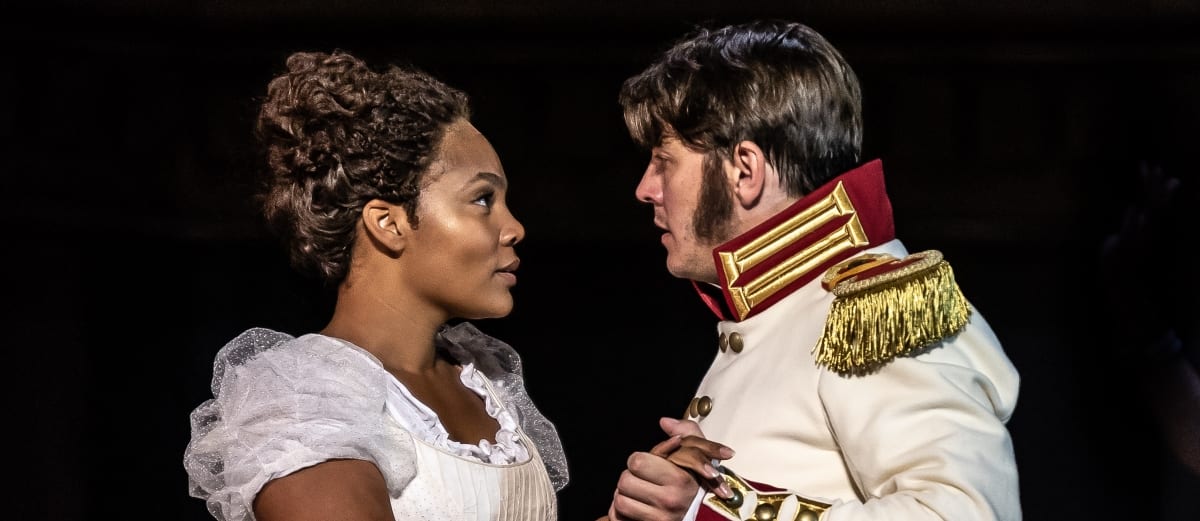Prokofiev’s operatic version of Tolstoy’s novel presents a range of challenges for any opera company. David Pountney’s production for Welsh National Opera meets those challenges head on and, for most of them, finds answers that are both musically and dramatically satisfying. For those that he misses, I am inclined to blame Prokofiev – or perhaps it would be fairer to blame the Soviet censors of the 1940s. In the end it is the stories of Andre, Natasha and Pierre that stick in the memory, rather than the endless reminders of the patriotic heroism of the Russian workers and peasants – led by Kutuzov, who stands as proxy for Stalin. Given that the bulk of the work was created as Hitler was subjecting Russia to privation and suffering every bit as harsh as that inflicted by Napoleon, this is understandable – but celebrations of patriotism don’t always make for great art.
Natasha Rostova gets engaged to the upright Andrei Bolkonsky but, while he is abroad, she almost elopes with the worthless Anatole. He is the brother of the equally worthless Helene, the wife of Pierre Bezhukov. Pierre becomes the confidant of the penitent Natasha and forces Anatole into exile. At this moment, news arrives that Napoleon has invaded. As the war progresses we see the gradual disintegration of the French army as the heroic defenders of Mother Russia choose to abandon Moscow and burn their food supplies to ensure that the French soldiers starve. At last, Pierre achieves a personal salvation through his relationship with the peasant Platon Karatayev and the suffering he experiences while a prisoner of the retreating French. The opera ends as General Kutuzov leads his forces to victory.
There are some glorious, if jingoistic, choruses magnificently sung by the brilliant WNO chorus. There are outstanding performances by Jonathan McGovern as Andrei, Lauren Michelle as Natasha, and especially Mark Le Brocq as Pierre. In contrast to the bombastic if tuneful chorus, some of the finest moments in the piece come with the duets – between the penitent Natasha and the dying Andrei, and between the bemused and likeable Pierre and his loathsome brother-in-law Anatole. With more than seventy roles specified in the libretto, the custom is for performers to sing multiple roles and many deliver fine cameo moments. The splendid Leah-Marian Jones displays her range by singing the haughty Princess Marie in the first half and Murat’s aide-de-camp in the second – along with two other roles!
The stage design is superb with a large screen at the back of the stage showing Tolstoy’s words, grand scenes and some video images of battle scenes. The deft use of screens and curtains allows the action to move swiftly forward when needed, and the constant watchful presence on stage of watchful chorus members (representing the people) as private encounters take place emphasises Prokofiev’s vision of the links between personal struggles and global conflicts. The opera needs a director comfortable with huge forces and big ideas, and Pountney is the man for that job. Tomas Hanus brings the best out of the fine WNO orchestra. Despite the exciting chorus numbers, this opera is overwhelming based on the patterns of individual speech and Hanus is always on top of the need to produce the controlled orchestral sound that allows the words to ring out across the pit to the audience.
This production is a triumph for Pountney and Hanus – sad to think that it will be one of their last joint efforts for WNO. While this is not a great opera, WNO brings to vivid life an important milestone in Russian music and you do not have to be an opera buff to be swept along by this epic story and swept away by some wonderful singing.

